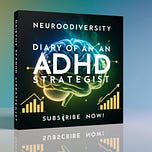My Personal Focus Nightmare (Until It Wasn't)
When I first heard about "The One Thing" productivity method, I literally laughed out loud. One thing? ONE THING?
My ADHD brain was juggling approximately 74 different thoughts at that exact moment, bouncing between "I should reorganise my sock drawer by colour" and "What if dolphins secretly have their own underwater civilisation?"
💭 Who is this Gary Keller Guy, and has he ever met someone with ADHD?
Focusing on ONE thing feels about as realistic as me remembering where I put my keys... three times in a row... without a tracking device attached to them.
The concept seemed laughably simple: identify the single most important task that will make everything else easier or unnecessary, then focus exclusively on that task. For neurotypical folks, perhaps this is revolutionary.
For those of us with ADHD and dyslexia? It sounded like telling a fish to just "try being dry for a bit."
But here's the mad thing. After months of spectacularly failing to implement approximately 623 different productivity systems (no exaggeration), this absurdly simple approach has actually helped my chaotic brain more than anything else.
The ADHD Brain vs. Traditional Productivity Advice
Before I explain how "The One Thing" surprisingly works for my neurodivergent mind, let's talk about why most productivity advice feels like it was written in an alien language specifically designed to make us feel rubbish.
Our brains aren't broken; they're just differently wired.
My entire school life was a masterclass in feeling like a complete failure.
Words swimming across pages, teachers wondering why I couldn't "just focus," and me masking so hard I should have been given an Oscar for "Best Performance by a Child Pretending to Be Neurotypical."
It wasn't until college that I discovered my dyslexia, and much later that I understood my ADHD.
Traditional productivity systems typically assume:
You can accurately estimate how long tasks take (ha!)
You can prioritise based on "importance" rather than interest (double ha!)
You can easily transition between tasks (triple ha with a side of impossible!)
Your focus is a resource you can consciously direct (excuse me while I hyper-focus on researching medieval farming techniques for 6 hours instead of that urgent deadline)
The truth is, we have what Dr. William Dodson brilliantly terms an "interest-based nervous system." Our brains are motivated primarily by:
Novelty (ooh, shiny new thing!)
Interest (this genuinely excites me)
Challenge (this is tricky in a stimulating way)
Urgency (oh god, it's due in 20 minutes)
Without these elements, our executive function goes on holiday without sending a postcard. It's not laziness or lack of willpower—it's neurochemistry, specifically involving dopamine pathways that function differently in our brains.
How "The One Thing" Can Actually Work for ADHD (With Some Crucial Adaptations)
Now here's where things get interesting. The core principle of "The One Thing" actually aligns surprisingly well with how ADHD brains function—when properly adapted.
The Power of Breaking It Down
First, I had to adapt the famous focusing question. Instead of "What's the ONE thing I can do that makes everything else easier or unnecessary?" I ask:
"What's the ONE thing I can do right now, in the next 25 minutes, that will move me forward on what matters?"
💬 "But what if I don't know what matters most?" I hear you cry.
Valid point! So I use this approach across different time scales:
Yearly: "What's the ONE area of my life I want to significantly improve this year?"
Monthly: "What's the ONE project that would make the biggest difference this month?"
Weekly: "What's the ONE task that would make this week successful?"
Daily: "What's the ONE thing I need to handle today no matter what?"
Right now: "What's the ONE next step I can take in the next 25 minutes?"
This temporal breakdown works brilliantly for those of us with time blindness. It makes the abstract concrete and the overwhelming manageable.
Making It Interesting (Because Let's Be Honest, We Need That)
Here's the genius part—I've learned to hack my interest-based nervous system by finding ways to make the important thing interesting.
For example, I needed to sort through a mountain of boring paperwork (universally acknowledged as an ADHD nightmare). Instead of fighting against my brain's need for stimulation, I:
Created a ridiculous points system with rewards
Set up a competition against my previous "best time"
Added music that changes every 5 minutes to create novelty
Used colourful markers to make visual progress maps
Did I look slightly unhinged dancing around my living room while sorting council tax forms? Absolutely. Did I get it done in record time? Also yes.
Bold realisation: I don't need to change my brain's wiring; I need to work WITH it.
Tackling Time Blindness
One massive challenge for most of us with ADHD is time perception—or what I affectionately call "time optimism delusion."
I genuinely believe I can shower, get dressed, make breakfast, reply to 12 emails, and reorganise my bookshelf... all in 20 minutes.
To adapt "The One Thing" approach for this challenge:
I use visual timers everywhere (the Time Timer app is my saviour)
I break down my ONE thing into ridiculously small steps
I estimate how long each step will take, then multiply by 3 (seriously)
I use "time anchors" (this task takes about one episode of my favourite show)
When I anchor time to concrete, visual references, suddenly I can "see" it in a way that makes sense to my brain.
The Neuroscience Behind Why This Works
It's not just anecdotal—there's actual science explaining why single-tasking can be particularly beneficial for ADHD brains.
Our prefrontal cortex—the brain's executive function centre—often shows weaker functioning in ADHD. This area is responsible for attention regulation, decision-making and impulse control. Every time we switch tasks, we place additional cognitive load on this already challenged system.
Single-tasking reduces the demands on our prefrontal cortex, allowing us to allocate our limited executive function resources more effectively.
Even more fascinating is what happens when we manage to engage with something interesting: our brains release dopamine, which improves motivation and focus, creating a positive feedback loop. By intentionally adapting our ONE thing to engage our interest, we're essentially hacking our brain chemistry to work with us rather than against us.
Real-World Examples: The One Thing in Action
Let me share how this approach has transformed my ability to function:
Work Projects: I used to have 7 half-finished projects constantly open on my desktop, jumping between them like a caffeinated frog. Now I identify ONE project as my morning focus. I break it down into microtasks and use time blocking to protect that focus time. I've completed more in the past month than in the previous three.
Home Organisation: Instead of being overwhelmed by the state of my entire flat (which, let's be honest, often looks like a charity shop that exploded), I pick ONE surface or ONE category to tackle. Today's ONE thing might be "clear and clean the kitchen worktop"—nothing else.
Writing: This article would have typically taken me weeks of procrastination, followed by a frantic all-nighter. Instead, I broke it down: research was one day's ONE thing, outlining was another, and drafting each section became manageable daily ONE things.
When the "One Thing" Doesn't Work (Because Let's Be Real)
I want to be brutally honest—this approach isn't perfect for everyone with ADHD, and it doesn't work for me 100% of the time either.
The approach struggles when:
The ONE thing feels overwhelmingly boring: Sometimes, no matter how I try to make it interesting, my brain refuses to engage.
Hyperfocus kicks in on the wrong thing: I've had days where I intended to focus on an important report but ended up spending 7 hours researching the perfect desk plant instead.
Executive function is completely depleted: On high-stress days or during burnout, even identifying the ONE thing can feel impossible.
Certain jobs require rapid task-switching: Some careers simply demand multitasking, making a strict ONE thing approach impractical.
On these days, I've learned to be kinder to myself. Sometimes my ONE thing becomes simply "survive today" or "take a proper break"—and that's perfectly valid.
Practical Implementation: How to Start
If you're thinking of trying this approach, here's my neurodivergent-friendly implementation guide:
Start ridiculously small: Your first ONE thing should be laughably achievable. Build confidence through completion.
Make it visual: Create a physical representation of your ONE thing. Put it somewhere unavoidable.
Remove friction: Set up your environment to make starting your ONE thing as easy as possible.
Build in accountability: Use body doubling (working alongside someone else), commitment devices, or external deadlines.
Celebrate completions: Our brains need that dopamine reward to reinforce the behaviour.
Final Thoughts from My Neurodivergent Perspective
The beautiful irony of "The One Thing" approach is that by narrowing our focus, we actually expand our possibilities. When I try to do everything, I accomplish nothing. When I focus on just ONE important thing, I move forward.
I'm not "cured" of my ADHD traits, nor would I want to be. My brain's unique wiring gives me creativity, out-of-the-box thinking, and intense passion that I wouldn't trade away.
But by adapting this surprisingly simple approach to work WITH my neurodivergent brain rather than against it, I've found a way to harness my strengths while managing my challenges.
And perhaps that's the ultimate ONE thing—not changing who we are, but finding systems that allow our authentic selves to thrive.
💭 I probably should have mentioned that I wrote this entire article while sitting upside down on my sofa with music playing and occasionally getting up to pace around. Because that's how my brain works best, and I've finally stopped apologising for it.
What's your ONE thing going to be today?













Share this post